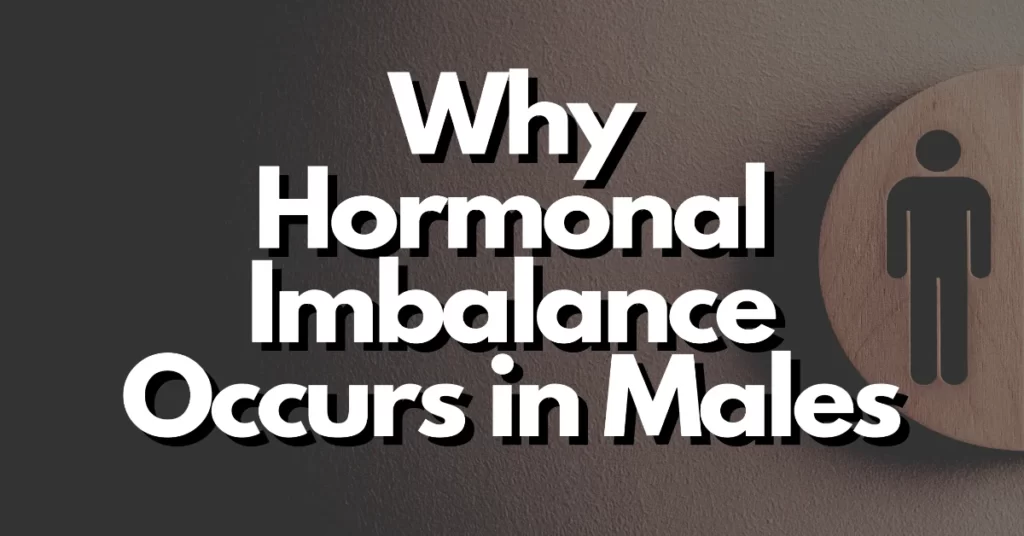Hormonal imbalances are often associated with females, but males can also experience disruptions in hormone levels, leading to various symptoms and health concerns.
In this blog post, we will explore the reasons behind hormonal imbalances in males, shedding light on the factors that can contribute to these imbalances. Understanding why hormonal imbalances occur in males can help create awareness and provide insights into prevention, detection, and treatment.

Table of Contents
Unraveling the Factors Contributing to Hormonal Imbalance in Men:
Hormonal imbalances can affect both men and women, but the factors contributing to hormonal imbalance in men are unique. Several factors can disrupt the delicate balance of male hormones, such as testosterone. Aging is a primary factor, as testosterone levels naturally decline with age.
Other potential contributors include certain medical conditions like hypogonadism, obesity, chronic stress, medications, environmental toxins, and lifestyle factors such as poor diet, lack of exercise, and inadequate sleep. Understanding these factors is essential for identifying the root causes of hormonal imbalance in men and developing appropriate interventions.
Consulting with healthcare professionals, such as endocrinologists or urologists, can help unravel the factors contributing to hormonal imbalance and guide the management process.
Investigating the Impact of Aging on Male Hormone Levels:
Aging has a significant impact on male hormone levels, particularly testosterone. As men age, testosterone production gradually declines. This age-related decline in testosterone, often referred to as andropause or male menopause, can result in various symptoms such as fatigue, reduced libido, muscle loss, weight gain, mood changes, and cognitive decline.
However, it’s important to note that not all men will experience significant hormonal changes or symptoms with aging. The impact of aging on male hormone levels can vary among individuals.
Consulting with healthcare professionals specializing in men’s health can help assess hormone levels, evaluate symptoms, and determine if interventions such as hormone replacement therapy or lifestyle modifications are necessary to manage the impact of aging on male hormone levels effectively.
Understanding Medical Conditions and Lifestyle Factors that Disrupt Hormonal Balance in Males:
Several medical conditions and lifestyle factors can disrupt hormonal balance in males. Medical conditions such as hypogonadism, thyroid disorders, obesity, diabetes, and certain medications can affect hormone production and regulation.
Lifestyle factors, including poor nutrition, lack of exercise, excessive alcohol consumption, chronic stress, and inadequate sleep, can also contribute to hormonal imbalances. It is important to address these underlying conditions and modify lifestyle factors to restore hormonal balance.
Consulting with healthcare professionals specializing in hormonal health can provide guidance on managing specific medical conditions, making lifestyle changes, and implementing appropriate interventions to support hormonal balance in males.
Seeking Solutions: Treatment Options and Management Strategies for Hormonal Imbalance in Men:
Treating hormonal imbalances in men requires a comprehensive approach that may include lifestyle modifications, medications, and hormone replacement therapy. Lifestyle changes such as adopting a balanced diet, engaging in regular exercise, managing stress levels, improving sleep quality, and avoiding environmental toxins can help support hormonal balance.
In some cases, medications or hormone replacement therapy may be recommended to restore hormone levels and alleviate symptoms. Testosterone replacement therapy (TRT) is a common treatment option for men with low testosterone levels. It involves the administration of exogenous testosterone through gels, injections, patches, or pellets.
However, the decision to pursue hormone replacement therapy should be made in consultation with healthcare professionals who specialize in men’s health. They can assess individual needs, evaluate risks and benefits, and guide individuals through the treatment process.
Conclusion
Hormonal imbalances in males can arise due to various factors, including age, lifestyle choices, underlying medical conditions, medications, and environmental factors. Conditions such as hypogonadism (low testosterone), thyroid disorders, and adrenal dysfunction can disrupt hormonal balance in males.
It is important to seek medical evaluation and guidance from healthcare professionals specializing in hormonal health to accurately diagnose and treat hormonal imbalances. Lifestyle modifications, such as a healthy diet, regular exercise, stress management, and getting adequate sleep, can support hormonal balance in males.
Remember, hormonal imbalances can affect males as well, and early detection and appropriate treatment can help improve overall health and well-being.

